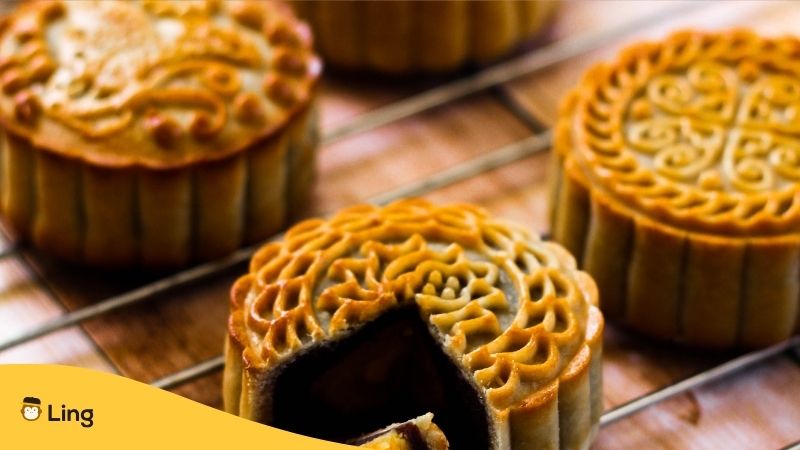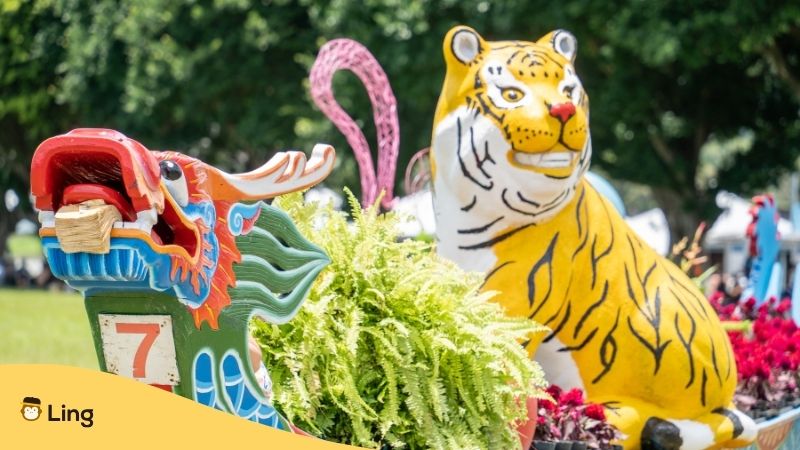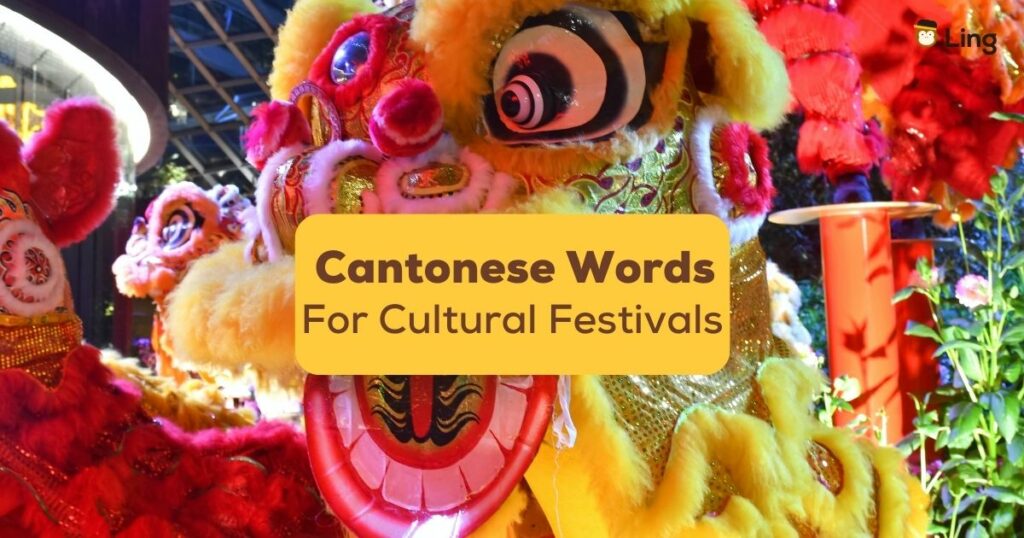Among the countless cultural festivities that take place in Hong Kong throughout the year, some stand out as true spectacles. But, to truly immerse yourself in the spirit of these events it helps to understand some Cantonese words for cultural festivals and the quirky goings-on that accompany the jollity.
With this in mind, we will be getting involved in the most significant cultural festivals in Hong Kong, the dates they will next be taking place, and the Cantonese words that are essential for appreciating and participating in these bonkers celebrations.
Chinese Cultural Festivals
Cantonese holidays or cultural festivals are vibrant celebrations steeped in tradition, where families come together to honor their rich heritage. From the exuberant Lunar New Year to the mystical Lantern Festival, these events showcase China’s profound history and customs.
Chinese New Year – Chūnjié (春節)
King of the conviviality is Chinese New Year, also known as the Spring Festival, which is the most important festival in Chinese culture. It marks the beginning of the lunar new year and is a time for family gatherings, feasting, and honoring ancestors. In Cantonese, it is called “Chūnjié” (春節, pronounced ceon1 zit3), where “春” (ceon1) means spring and “節” (zit3) means festival.
Some Cantonese words and phrases commonly used during this festive time include:
- Red Envelopes or “Lì shì” (利是, lei6 si6) containing money given as gifts, symbolizing good luck and prosperity.
- “Congratulations And Be Prosperous” or “Gōngxǐ fācái” (恭喜發財, gung1 hei2 faat3 coi4) is a common Cantonese New Year greeting.
- Lion Dance or “Lóng shī” (龍獅, lung4 si1) is a traditional performance involving lion costumes and drums to ward off evil spirits.

Mid-Autumn Festival – Zhōngqiū Jié (中秋節)
Next up is the Chinese Mid-Autumn Festival which is celebrated on the 15th day of the eighth month in the Chinese lunar calendar. It is a time for family reunions and moon-gazing while enjoying mooncakes. In Cantonese, it is called “Zhōngqiū jié” (中秋節, pronounced as zung1 cau1 zit3).
Key Cantonese words associated with this festival include:
- Moon Cakes or “Yuèbǐng” (月餅, jyut6 beng2) are a traditional pastry often filled with lotus seed paste, salted egg yolks, and various other yummy fillings.
- Jade Rabbit or “Yùtù” (玉兔, juk6 tou3) is a mythical creature said to live on the moon, often mentioned in Mid-Autumn Festival folklore.
- Lanterns or “Dēnglóng” (燈籠, dang1 lung4) are lit and displayed during lantern festivals that coincide with the Mid-Autumn Festival.
Ching Ming Festival – Qīngmíng Jié (清明節)
Ching Ming Festival (or Qingming Festival), also known as Tomb-Sweeping Day, is a time for Chinese people and their families to pay their respects to deceased ancestors by visiting Buddhist temples and cleaning their graves. In Cantonese, it is called “Qīngmíng jié” (清明節, pronounced as cing1 ming4 zit3).
Some Cantonese words relevant to this festival include:
- Sacrificial Offerings or “Jì pǐn” (祭品, zai3 ban2) are offerings such as food, paper money, and incense sticks that are presented at ancestral graves.
- Tomb Sweeping or “Sǎo fén” (掃墳, sou2 fan4 zit3) is the act of cleaning and maintaining ancestral graves.
- Paper Money or “Zhǐqián” (紙錢, zi2 cin2) is burned as an offering to provide some useful cash for the deceased in the afterlife.
- Burning Incense or “Shāoxiāng” (烧香, siu1 hoeng1) is a symbol of paying respect to ancestors.

Dragon Boat Festival – Duānwǔ Jié (端午節)
The Dragon Boat Festival, also known as Tuen Ng Festival, usually takes place around mid-June, celebrates the legendary poet Qu Yuan and involves dragon boat races and eating zongzi (sticky rice dumplings). In Cantonese, it is called “Duānwǔ jié” (端午節, pronounced as dyun1 ng5 zit3).
Key Cantonese words related to this festival include:
- Dragon Boat or “Lóngzhōu” (龍舟, lung4 zau1) is a long, narrow boat decorated like a dragon, used in races during the festival.
- Zongzi (粽子, zung2 zi2) are pyramid-shaped dumplings made from glutinous rice wrapped in bamboo leaves.
- Dragon Boat Races or “Sài lóngzhōu” (賽龍舟, coi3 lung4 zau1) are what the festival is all about.
- Salted Rice Dumplings or “Xián zòng” (鹹粽, haam4 zung2), or Savory zongzi, are dumplings filled with ingredients like pork, mushrooms, and salted egg yolks.
Cheung Chau Bun Festival – Zhǎngzhōu Tàipíng Qīng Jiào (長洲太平清醮)
The Cheung Chau Bun Festival is a unique and vibrant celebration on Cheung Chau Island, featuring towering bun towers and colorful parades. In Cantonese, it is called “Zhǎngzhōu tàipíng qīng jiào” (長洲太平清醮, pronounced as coeng4 zau1 taai3 ping4 cing1 ziu3).
Important Cantonese words for this festival include:
- Fragrant Pouches or “Xiāng bāo” (香包, hoeng1 baau1) are traditionally used as offerings to the deities during festivals, including the Dragon Boat Festival, to cast away any evil spirits that might be hanging around.
- Flag Pulling or “Chě qí” (扯旗, ce2 kei4) is a thrilling event where participants scale the bun towers and pull down flags to win prizes.
- Float Parades or “Huāchē xúnyóu” (花車巡遊, faa1 ce1 seon4 jau4) featuring elaborately decorated floats and traditional performances.
- Bun Scrambling Competitions or “Qiǎng bāo shān bǐsài” (搶包山比賽, coeng2 baau1 saan1 bei2 coi3) where participants race to climb the bun towers and collect buns.
Hong Kong’s biggest cultural festivals are not only visually stunning but also deeply rooted in intangible cultural heritage, tradition, and history. Understanding the Cantonese words associated with these festivals can enhance your appreciation of these celebrations and help you fully immerse yourself in the local culture. Whether you’re enjoying mooncakes during the Mid-Autumn Festival or witnessing the excitement of a dragon boat race, knowing the right Cantonese words can bring you closer to the heart of Hong Kong’s vibrant cultural heritage.
So, the next time you leave the Western world behind and find yourself in Hong Kong and Guangdong Province during one of these festivals, remember these words and phrases to fully experience the magic of the moment.
Learn More Cantonese Words For Cultural Festivals With Ling
We have only skimmed the surface of the weird and wonderful words and events associated with traditional Chinese festivals in Hong Kong. We haven’t even touched on the Hungry Ghost Festival in mid-August, the Lantern Festival, or the Double Seventh Day Festival. But don’t worry, we will get around to it. Make sure you don’t miss any updates by downloading Ling from Google Play or the App Store.































































